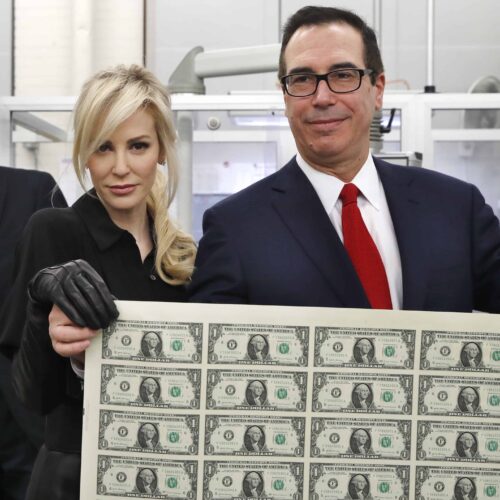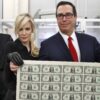Introduction
Subscribe on Spotify | Google | Stitcher | TuneIn | Pandora | Apple Podcasts
Episode 2 of The Heist
When then-candidate Donald Trump was running for president, he made three big promises: build a border wall, repeal Obamacare and cut taxes.
He didn’t deliver on the first two. But on the third, he triumphed, passing one of the biggest tax breaks in U.S. history.
Trump’s point man to make it happen: Steven Mnuchin.
As treasury secretary, Mnuchin was the face of the tax bill. He appeared on television talk shows, testified before Congress and met regularly with the Republican leadership in Congress. Three years later, he was the White House’s key figure in helping shape and administer stimulus programs aimed at softening the economic blow from the COVID-19 pandemic.
Mnuchin’s worldview, shaped by his well-heeled upbringing and work on Wall Street, is reflected in the tax law. To understand his thinking, the Center for Public Integrity examined what makes him tick. We found that he isn’t driven by ideology or a faithful adherence to party. Instead, he does whatever he needs to do to promote his own self-interests.
Mnuchin’s high school years are a good place to start.
He went to Riverdale Country School in the Bronx. It was small and exclusive; tuition last year was about $50,000. During Mnuchin’s time there, the school was predominantly white. Mnuchin didn’t belong to a particular clique but is remembered for driving a red Porsche.
His father, Robert, was a partner at the investment firm Goldman Sachs. Robert’s financial connections opened up a lot of opportunities for his son. Steven attended Yale University, his father’s alma mater. There he was a member of Skull and Bones, a secret society that counts as past members three presidents — William Taft and both Bushes, George H.W. and George W. His roommate at one time was Eddie Lampert, who would start a hedge fund and become CEO of Sears, where he and his old college roommate were accused of selling off its assets and driving the company into bankruptcy. (He now owns the company.)
David Dayen, executive editor of the left-leaning American Prospect and author of a biography on Mnuchin, said a former Yale classmate joked that “Mnuchin put the douche in fiduciary. … Maybe he wasn’t well liked, but he definitely knew the right people.”
After graduating, Mnuchin joined Goldman Sachs, like his father, and became partner and chief information officer. He owned a $10.5 million apartment on Park Avenue in the same building where the Guggenheims, Vanderbilts and Rockefellers once lived. His apartment had five bedrooms, seven bathrooms, marble floors and a private elevator landing.
Mnuchin later worked for the hedge fund Lampert started, and then would launch his own. Mnuchin also invested in real estate, including some deals with Donald Trump before he ran for president.
“I don’t want to say he’s the luckiest man alive,” Dayen said, “but if you look at his history, it certainly feels that way.”
The foreclosure king
A lot of recent treasury secretaries came from the worlds of big business or investment banking. But many also had worked in government.
Mnuchin’s career choices before 2016 showed no signs of interest in public service.
In 2008, the subprime mortgage crisis hit. Banks nationwide were failing. Mnuchin saw an opportunity. In 2009, he and a group of investors pooled $1.6 billion to buy up the remains of one of the largest banks that went under — IndyMac. They combined IndyMac with the remains of other banks to create OneWest. The new bank foreclosed on mortgages. It was voracious and not very careful.
A leaked memo from the California attorney general’s office accused OneWest of “widespread misconduct.” The attorney general didn’t move forward with a case, but the memo included a telling notation: “Case NOT filed despite strong recommendations.” The prosecutors who wrote it accused OneWest of illegally foreclosing on thousands of homeowners.
The Federal Deposit Insurance Corporation required banks such as OneWest to work with homeowners to modify mortgages so people could stay in their homes. If a homeowner couldn’t afford the cheaper mortgage, the FDIC promised it would cover most of the bank’s losses. But banks had an incentive to foreclose anyway because it was faster, easier and cheaper. And it was legal.
Mnuchin earned a nickname in the press: The foreclosure king.
In 2015, Mnuchin and the other owners of One West sold the bank for almost $2 billion more than they’d bought it for.
Mnuchin has had his hands in other financial adventures. Even Hollywood.
He has 42 movie credits as an executive producer, including the Lego Movie and Batman v. Superman: Dawn of Justice. Mnuchin saw Hollywood as a playground, said Kim Masters, an editor-at-large at the Hollywood Reporter who wrote about this period of Mnuchin’s life.
“I think he wanted to make money,” Masters said. “I don’t think he went in saying, ‘I hope I lose millions of dollars,’ which I think he certainly did. But I think he got the perks.”
Those perks, Masters said, included parties on yachts, flights on private jets and meetings with Eastern European oligarchs. He met his third and current wife, Louise Linton, at a party.
‘He made the bet and won’
What drives Mnuchin is a bit of a mystery. If he has a life philosophy, it’s “make as much as you can, as for as long as you can,” Dayen said. “His worldview is, ‘Whoever’s in front of me, paying me’” is what matters. And that, Dayen said, “is right in line with Trump.”
For Mnuchin, politics are transactional. A candidate’s policy positions — be it liberal or conservative — don’t matter. Mnuchin has donated tens of thousands of dollars over the years to both Republicans, such as 2012 presidential candidate and now senator Mitt Romney and former speaker of the House of Rpresentatives Paul Ryan, and Democrats such as Barack Obama and Hillary Clinton.He also worked for the GOP’s ultimate boogeyman, George Soros.
So, how did he end up working for Trump?
David Levinthal, senior Washington correspondent for Business Insider and former editor-at- large at the Center for Public Integrity, said some donors like Mnuchin try to make sure they get access to whoever wins the election, Republican or Democrat. They hedge their bets by giving to both sides.
Mnuchin was appealing to Trump not because of his economic theories or conservative bona fides, but because he “is really, really good at raising money,” Levinthal said.
Trump hired Mnuchin to be finance manager for his 2016 presidential campaign. In true Mnuchin fashion, he joined the campaign late — the same month it became clear Trump would win the Republican nomination.
Mnuchin “was asked by somebody, ‘Why would you sign up with Donald Trump?’” Dayen said. “And he said something like, ‘Well, this is a bet. And if I win, I’m going to get a really big prize.’ He made the bet and he won.”
Mnuchin’s father, stepmother and sister are Democrats. They supported Hillary Clinton in her 2016 presidential bid. The last time Mnuchin’s father gave to a Republican was in 2003. His sister’s Facebook page has photos of Obama. A source who asked to remain anonymous said when Mnuchin took the job with Trump, the family was devastated. His family couldn’t be reached for comment.
These contradictions make Mnuchin hard to understand. Whatever the reason that led him to support Trump, it turned out to be lucky for the president. Trump was on the hunt for a treasury secretary, and he didn’t have many options. Trump didn’t have ties to Wall Street, which had shunned him.
“There wasn’t a lot of people left for Trump to go to other than Steve Mnuchin,” Dayen said.
But it wasn’t a choice without controversy. At his Senate confirmation hearing in 2017, Mnuchin’s history with OneWest came up.
The day before the hearing, Sen. Elizabeth Warren, D-Mass., convened a special meeting of homeowners who’d been foreclosed on by the bank.
“I hear that Steve Mnuchin was a leader of the bank that is doing this to me and other seniors,” one woman who was being foreclosed on said at the meeting. “I do not think a man like that should be the treasury secretary and in charge of our economy.”
Mnuchin defended himself.
“One of the greatest reasons I was drawn to President-elect Trump’s campaign was it was predicated on a commitment to stimulating prosperity for Americans of all backgrounds — whether they lived in the inner-city of Detroit, rural North Carolina, the coal country of Ohio, or West Virginia, or any place in between,” he testified at the hearing. “I share the president-elect’s goal to economically empower every citizen. We will not rest in our mission until that is a reality.”
Signing the money
Once ensconced at the Treasury Department, Mnuchin perplexed his colleagues. A former department executive who worked closely with Mnuchin called him an “odd duck,” because the topics he wanted to discuss in meetings were sideshows to the complicated policies affecting the nation.
In one 45-minute briefing early in his tenure, Mnuchin seemed uninterested in the topics, said the former executive, who asked not to be identified for fear of retaliation in his current job. But Mnuchin perked up when the discussion moved off the agenda, and to a change in rules for alimony.
“He was like, ‘What? The alimony rules? Talk to me,’” the source recalled. “I was not prepared because I didn’t think it was important, but we spent 25 minutes talking about changes to alimony rules.”
Mnuchin also was fascinated with cash — as in, when was he going to sign the bills the Treasury Department distributes nationwide?
“The thing that he frequently asked about is: ‘When are we going to sign the money?’” the former executive said. “He was giddy, giddy about that.”
But that wasn’t the “craziest thing,” the source said. When Trump suggested Americans file their taxes on a postcard, Mnuchin suggested the IRS should require taxpayers to write their cell phone numbers and email addresses on the card.
“He said, ‘Everybody else uses email and phones and texting. Why should the IRS not interact that way?’” the former executive said. “The IRS people were like, ‘Well, because we already have so much fraud. You don’t want people to think that the IRS is really texting them or sending them an email.’”
‘Both sides’
Mnuchin’s first big responsibility as treasury secretary was pushing through Trump’s tax bill, which was a windfall for corporations and wealthy people. Mnuchin began selling it as a break for middle-income families that wouldn’t add to the national debt.
“The objective of the president is that rich people don’t get tax cuts,” Mnuchin said Oct. 1, 2017, on This Week with George Stephanopoulos.
“But the tax cuts that went to anyone lower down on the income distribution tables were much smaller and all expire in a few years,” the former Treasury executive said. “I think it was important for them politically to have the cover of saying, ‘Look, we did something for people down the chain,’ but that was never what was important.”
There’s something else to know about Mnuchin. In the summer of 2017, the year he was confirmed as secretary, a rally was held in Charlottesville, Virginia, by neo-Nazis.
Young, mostly white men, wearing polo shirts and khaki pants, carried tiki torches and chanted, “Jews will not replace us.” The next day, they marched carrying Confederate flags and brandished swastikas. That day a protestor was killed.
Afterward, Trump pinned the blame on “both sides.” He spoke at Trump Tower, in front of a marble wall and an American flag. Mnuchin, a Jew, was standing at his side.
The fact that Mnuchin supported Trump, who was seemingly supporting neo-Nazis, did not go over well. Alumni from Yale and Mnuchin’s high school sent letters calling on him to resign.
Instead, Mnuchin issued a statement defending the president. “I don’t believe the allegations against the president are accurate,” he wrote, noting he was Jewish.
Many found Mnuchin’s explanation confounding. That may be because Mnuchin can’t be pinned down, categorized. He is more of a chameleon. He’s always going to change depending on the moment and the transaction. In the case of Charlottesville, Mnuchin supported the views of his boss, Donald Trump.
Mnuchin has taken a similar stance on the tax law, adopting Trump’s repeated claims that the cuts greatly benefited middle-income families even though most reputable studies show otherwise.
About a year after the tax bill passed, Mnuchin sat down for an interview with Kai Rysdall, the host of the public radio show Marketplace. Rysdall asked Mnuchin what it was about Trump’s economic approach that made him want to work for the man.
“I operated banks that went under during the financial crisis,” Mnuchin replied. “I saw how important banks are to local communities. I felt an obligation to try to do things that would help people and help the economy, and particularly the middle class. And I think we’re very proud of these accomplishments.”





Join the conversation
Show Comments